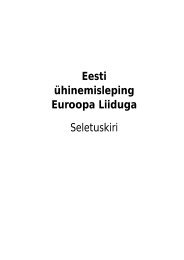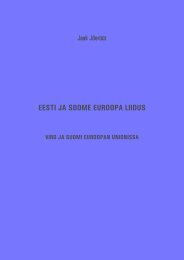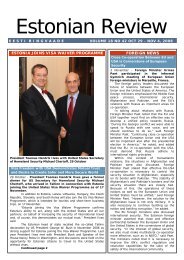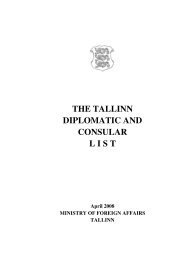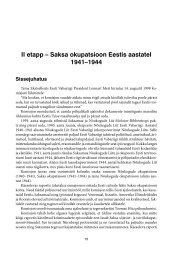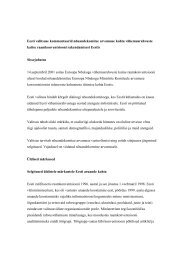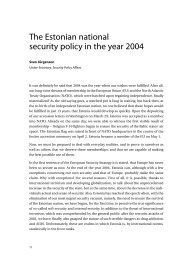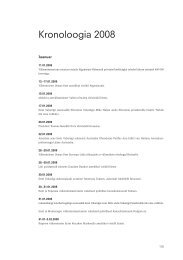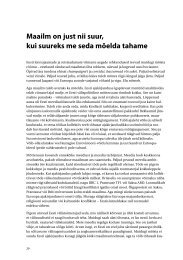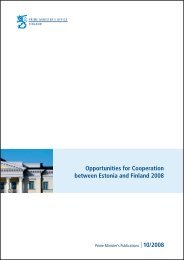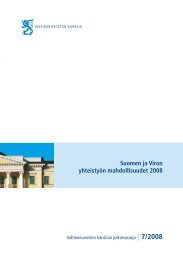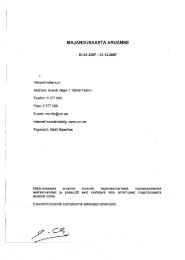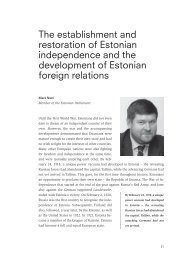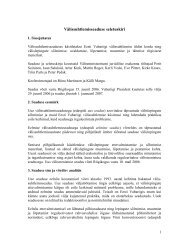You also want an ePaper? Increase the reach of your titles
YUMPU automatically turns print PDFs into web optimized ePapers that Google loves.
April 2008<br />
• Estonia has retained its 20th place in the Networked Readiness Index (NRI) published by the World<br />
Economic Forum as part of its Global Information Technology Report 2007-2008. Lithuania has<br />
climbed to place 33 from place 39 in the survey published a year ago while Latvia has slid from place 42 to 44.<br />
Published for the seventh consecutive year with a coverage of 127 economies worldwide, the report offers a<br />
comprehensive and authoritative international assessment of the impact of ICT on the development process<br />
and the competitiveness of nations. Among the 12 new members of the EU, countries such as Estonia (20th),<br />
Slovenia (30th), Lithuania (33rd), the Czech Republic (36th), and Hungary (37th) have made remarkable<br />
progress in networked readiness, as well as general competitiveness, over the last two decades. Among these<br />
countries, Estonia, the tiny homeland of Skype, has benefited from a savvy e-leadership from a government<br />
that has fostered innovation and universal ICT access as a platform for improved competitiveness. Another<br />
Baltic state, Lithuania, realizes one of the biggest improvements, by six positions, in Europe from last year. The<br />
top six countries on the scoreboard for 2007-2008 are Denmark, Sweden, Switzerland, the United States,<br />
Singapore and Finland, in that order.<br />
• <strong>Estonian</strong> companies and individuals have registered more than 6,500 .eu domain names in the first<br />
two years of its existence. The .eu web domain is a relatively new thing, but nevertheless interest in it is great<br />
in Estonia. Both entrepreneurs and private individuals regard the .eu domain as a good alternative for the<br />
generic .com, .net and .org Internet addresses and Estonia's top-ranking domain .ee whose registration<br />
conditions are still conservative. Registration for the European .eu web domain opened on April 7, 2006. Since<br />
then, the domain has picked up nearly three million customers.<br />
MEDIA. TELECOMMUNICATIONS<br />
• The <strong>Estonian</strong> government endorsed amendments to the Broadcasting Act, which among other things<br />
brings the date of switching off analog ground wave television forward to June 2010. The state had<br />
earlier set the final date of transition to digital television to before the beginning of 2012. As a result the<br />
government is planning to bring the switch forward by one and a half a years. There are currently about<br />
160,000 families receiving TV signal by their own arials in the analog system. On transition to digital television<br />
these families must acquire equipment enabling digital reception of TV picture.<br />
REAL ESTATE<br />
• According to the Colliers International real estate survey, despite office premises being added to the<br />
existing ones in Tallinn no glut of the market is to be expected in the city this year. The projects being<br />
built are mainly covered with preliminary contracts and the level of absorption remains high. However, as a<br />
result of toughening competition a rise in the level of vacancies and a slowdown in the growth in rental prices<br />
is to be expected. New developments of office premises will overwhelmingly be completed on the outskirts<br />
and business activity is concentrating in new areas outside the city center. Due to the shortage of new plots in<br />
the city center and continued high demand for A Class office premises owners have started reconstruction of<br />
existing office buildings in the city center. Growth in the offer of new office premises has led to the rise of<br />
vacancies; by the end of 2007 the vacancy rate of B class premises was 5.3 percent while the average vacancy<br />
rate of A class premises continued to be very low -- about 1.9 percent.<br />
TOURISM<br />
• In February 72,000 foreign tourists stayed in <strong>Estonian</strong> accommodation establishments, which is 7,000<br />
more than in the same month last year. Compared to February 2007, the number of tourists from Finland,<br />
Russia, Latvia and Lithuania increased. Typically of winter months, <strong>Estonian</strong> residents made up half of<br />
accommodated tourists. Their number grew by about 4,000 compared to February 2007. In February 678<br />
accommodation establishments with 16,200 rooms and 34,400 beds were available to tourists. The room<br />
occupancy rate was 36 percent. The average cost of a guest night was 457 kroons (EUR 29.2), up by 6 percent<br />
year-on-year. A guest night in Tallinn cost on the average 571 kroons, in Tartu 415 kroons and in Parnu 326<br />
kroons. In large accommodation establishments with more than 100 rooms, the average cost of a guest night<br />
was 516 kroons.<br />
TRANSPORT<br />
• Tallink is looking for possibilities to improve the result of the Finland-Germany route, given the<br />
combined effect of its length and the rise in fuel costs. Increased fuel prices have put pressure to the<br />
group results. Costs for fuel have climbed by approximately 297 million kroons (EUR 19 mln) during the first<br />
half-year, marking a rise of 47 percent. Given its length and speed of the service, almost half of the increase in<br />
fuel costs came from the Finland-Germany route. As a result of higher fuel costs and lower cargo volumes<br />
resulting from tougher competition in cargo transportation, the result of the Finland-Germany operation has<br />
6



